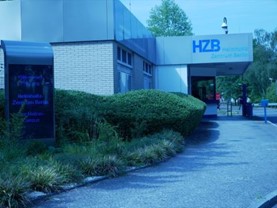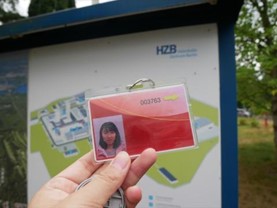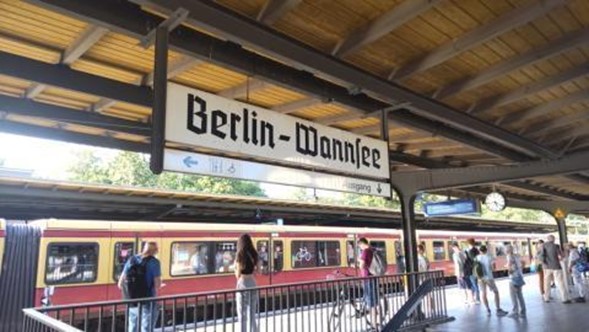Overseas Training Report
Material Science Special Seminar Ⅱ
Graduate school of Engineering, Ms. Yamaguchi
From February to August 2022, I studied abroad at Helmholtz-Zentrum-Berlin (HZB) in Berlin, Germany. I stayed with Prof. Roel van de Krol's Solar fuels group. Professor Krol was introduced to me by my supervisor, Professor Takamura. Although HZB is not a university but a research institute, it is affiliated with neighboring universities and has many graduate students.


Photo (left) Wannsee campus gate and (right) my admission card
The Wannsee Campus, where I attended, is located on the edge of Berlin, Germany, next to the city of Potsdam, which is familiar from the Potsdam Declaration. It was about an hour away from the center of Berlin, and the atmosphere was relaxed, surrounded by nature, with squares and lakes nearby.

Photo 3. The nearest Wannsee station. A lake with the same name is right next to it.
Prof. Krol's group was a multinational research team consisting of the Netherlands, India, Turkey, Taiwan, Israel, the Philippines, and so on. I can't speak German at all, so I was worried that I wouldn't be able to understand the language before traveling, but it worked out. The professors, postdocs, and students were all very kind and polite, and welcomed me warmly. Professor Krol's group is developing materials and cells that convert solar energy into hydrogen, oxygen, and electrical energy. I worked on research on the anode (hydrogen generation side) electrode of a photoelectrochemical cell. In terms of "energy conversion materials", it is the same as Takamura Laboratory, which I belong to, but "characteristic evaluation" was new and new to me, so I had a lot to learn. At HZB, I not only conducted experiments, but also participated in weekly seminars by Dr. Roel and students, as well as weekly group meetings. Thanks to this opportunity, I was able to interact with people other than the members of the same room and the same project, and to know the research contents of HZB researchers and students.
Because I prepared to study abroad due to the corona disaster,
- Must pay attention to immigration restrictions
- There is no senior who is close to my age and has experience studying abroad
- Fewer flights
- Increases the number of documents to be submitted, such as applying for business trip permission on campus, reporting immigration and immigration
Due to the influence of the world situation, the return flight I had booked was canceled, so the return date was pushed back one day. When I returned to Japan, the immigration restrictions in Japan were very strict, so I had to arrive at the airport at 6:00 in the morning to take a PCR test. There were twists and turns. It's a pity that I started studying abroad later than I had originally hoped, but by realizing my study abroad, working hard on my research there, and being able to return home safely, I gained a strange confidence that I can't explain in words. I was. It was a great opportunity for me to experience research in a new environment that was completely different from what I had been used to, and to meet fellow researchers from overseas who were working hard together. I would like to express my gratitude to Professor Takamura, Professor Krol, GP-MS Support Office, and Mate Accounting for their cooperation in making this study abroad a reality.
